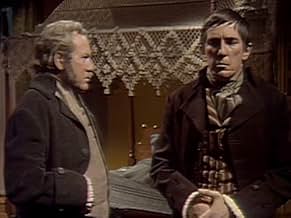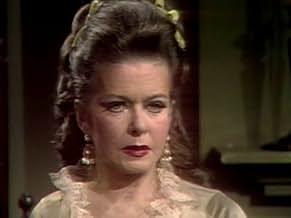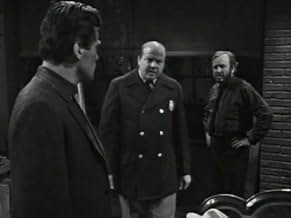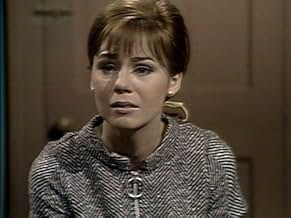Die reiche Familie Collins aus Collinsport, Maine, wird von seltsamen Vorkommnissen gequält.Die reiche Familie Collins aus Collinsport, Maine, wird von seltsamen Vorkommnissen gequält.Die reiche Familie Collins aus Collinsport, Maine, wird von seltsamen Vorkommnissen gequält.
- Für 1 Primetime Emmy nominiert
- 1 Nominierung insgesamt
Folgen durchsuchen
Empfohlene Bewertungen
To its fans, Dark Shadows was and remains the best fantasy television series ever produced for an American network. Its status as the best resulted from the chance interaction of a team of brilliant actors, writers, directors and producers who together made magic every afternoon at 4 pm out of what were often very unpromising materials. As the comment from a new teenaged viewer on this page shows, the show's appeal continues to draw in a new audience 30 years after its original broadcast.
Barnabas Collins, the pivotal character of the "vulnerable vampire," has become a part of postmodern folklore. The influence of Barnabas as a character and a concept has been widely seen, from Anne Rice's vampire novels to such recent cult series as Forever Knight and Buffy the Vampire Slayer. The central drama of Dark Shadows--a doctor in unrequited love with her vampire patient, whom she was trying to cure--was intriguingly reprised in the Canadian series Forever Knight, with Geraint Wyn-Davies and Catherine Disher taking on the roles originally played by Jonathan Frid and Grayson Hall.
Dark Shadows boasted perhaps the most impressive cast (in terms of sheer ability) ever assembled for an American daytime series. Actress Joan Bennett who played the matriarch provided a link with the world of film noir and Forties Gothic cinema upon which the style and mood of the series so clearly played. Jonathan Frid, Thayer David, the extraordinary Grayson Hall (probably the first instance of an Oscar nominated thesp taking a role in a soap opera), Nancy Barrett, Louis Edmonds, and John Karlen, all of whom had distinguished themselves both on and off Broadway, routinely turned in sterling performances with a minimum of rehearsal time. The show's initial realism gave way after a year or so to the "Dark Shadows school of acting"--a highly theatrical, dramatically stylised manner of putting the mood of a scene across with stunning effect. Among the newcomers who shone most strongly were Lara Parker (who enacted another variant of vindictive unrequited love as the witch Angelique), Alexandra Moltke as perennially clueless governess Victoria Winters, Don Briscoe as doomed werewolf Chris Jennings, and David Selby as roguish cousin Quentin Collins. One striking feature of the production was the use of multiple time periods and, ultimately, parallel time streams which allowed the actors to portray a wide variety of roles (Nancy Barrett and Thayer David each ended up playing some half a dozen sharply differentiated characters).
The New York production setting favored the occasional introduction of such veteran character actors as Anita Bolster, Cavada Humphrey, Abe Vigoda, and others in cameo spots. Young actors just starting out such as Harvey Keitel, David Groh, Kate Jackson, Virginia Vestoff, and Marsha Mason found brief or steady work on the series. Vestoff did a tour de force as the ruthless Samantha Collins at the same time (1970) as she was performing nightly in the hit musical 1776.
Derided by some, misunderstood by many, beloved by its legions of fans, Dark Shadows will never die!
Barnabas Collins, the pivotal character of the "vulnerable vampire," has become a part of postmodern folklore. The influence of Barnabas as a character and a concept has been widely seen, from Anne Rice's vampire novels to such recent cult series as Forever Knight and Buffy the Vampire Slayer. The central drama of Dark Shadows--a doctor in unrequited love with her vampire patient, whom she was trying to cure--was intriguingly reprised in the Canadian series Forever Knight, with Geraint Wyn-Davies and Catherine Disher taking on the roles originally played by Jonathan Frid and Grayson Hall.
Dark Shadows boasted perhaps the most impressive cast (in terms of sheer ability) ever assembled for an American daytime series. Actress Joan Bennett who played the matriarch provided a link with the world of film noir and Forties Gothic cinema upon which the style and mood of the series so clearly played. Jonathan Frid, Thayer David, the extraordinary Grayson Hall (probably the first instance of an Oscar nominated thesp taking a role in a soap opera), Nancy Barrett, Louis Edmonds, and John Karlen, all of whom had distinguished themselves both on and off Broadway, routinely turned in sterling performances with a minimum of rehearsal time. The show's initial realism gave way after a year or so to the "Dark Shadows school of acting"--a highly theatrical, dramatically stylised manner of putting the mood of a scene across with stunning effect. Among the newcomers who shone most strongly were Lara Parker (who enacted another variant of vindictive unrequited love as the witch Angelique), Alexandra Moltke as perennially clueless governess Victoria Winters, Don Briscoe as doomed werewolf Chris Jennings, and David Selby as roguish cousin Quentin Collins. One striking feature of the production was the use of multiple time periods and, ultimately, parallel time streams which allowed the actors to portray a wide variety of roles (Nancy Barrett and Thayer David each ended up playing some half a dozen sharply differentiated characters).
The New York production setting favored the occasional introduction of such veteran character actors as Anita Bolster, Cavada Humphrey, Abe Vigoda, and others in cameo spots. Young actors just starting out such as Harvey Keitel, David Groh, Kate Jackson, Virginia Vestoff, and Marsha Mason found brief or steady work on the series. Vestoff did a tour de force as the ruthless Samantha Collins at the same time (1970) as she was performing nightly in the hit musical 1776.
Derided by some, misunderstood by many, beloved by its legions of fans, Dark Shadows will never die!
This daytime television soaper-shocker serial has evolved into a cult classic since originally airing on ABC from 1966-71, and is certainly a contender for one of the most unusual television series ever made. In addition to its Gothic tales involving the supernatural, what set DARK SHADOWS apart from the other TV soap operas of its day was the remarkable cast, including famous and glamorous Hollywood screen star Joan Bennett as the aristocratic matriarch Elizabeth Collins Stoddard, Oscar-nominated actress Grayson Hall(THE NIGHT OF THE IGUANA) as Dr. Julia Hoffman who tried to develop a cure for vampire Barnabas Collins but wound up falling in love with him instead. And of course, the superb Jonathan Frid as reluctant vampire Barnabas Collins himself. Incidentally, Frid's perpetually tormented character was what brought the show such tremendous success and remains the best remembered aspect of this enduringly popular series. Made on a noticeably low budget, DARK SHADOWS concentrated on plot and character rather than cheap thrills, though there were plenty of eerie, spooky moments and creepy Gothic atmosphere. The primetime revival of the ever-popular series in 1991 featured more elaborate settings and special effects but was less successful and lasted barely two months on the airwaves. Like it or not, DARK SHADOWS completely changed television history and remains one of the most well-remembered TV series of all time. The show's success led to two offshoot feature films starring a number of the series regulars. The first and most successful was HOUSE OF DARK SHADOWS in 1970, followed by NIGHT OF DARK SHADOWS in 1971.
Like many people I used to rush home from grammar school to see this Gothic soap opera. I distinctly remember being petrified of the werewolf and running out of the room when Barnabas bit somebody.
Seeing it now it's still sort of creepy. It moves very slow (of course) and the black & white seasons are extremely dull with really pathetic special effects and threadbare settings. But when the series switched to color and started to really be popular (in 1967) it really got going. The special effects improved, the settings and costumes got more elaborate and the plot lines went barreling out of control. Also they had a good cast who played all their roles seriously. That's good, because if they had camped it up or winked at the audience it would have fallen apart.
A good, fun horror soap. It's a good thing it's available on video and DVD now.
Seeing it now it's still sort of creepy. It moves very slow (of course) and the black & white seasons are extremely dull with really pathetic special effects and threadbare settings. But when the series switched to color and started to really be popular (in 1967) it really got going. The special effects improved, the settings and costumes got more elaborate and the plot lines went barreling out of control. Also they had a good cast who played all their roles seriously. That's good, because if they had camped it up or winked at the audience it would have fallen apart.
A good, fun horror soap. It's a good thing it's available on video and DVD now.
I didn't even see Dark Shadows on TV until it began running as reruns back in 1976. Even though these episodes were ten years old at the time, I was instantly hooked. I had never seen anything like it - a Gothic soap opera with a vampire as both heartthrob and sympathetic villain. The 1976 reruns did the same thing the initial DVD collection did. It ignored the fact that the first 210 episodes ever existed and started with the appearance of Barnabus Collins in Collinsport, Maine, and the simultaneous disappearance of Willie Loomis, the Collins' handyman. I've never seen the first 210 episodes, but I've read their descriptions. Apparently they revolved around a series of love triangles and mysteries that just weren't that interesting to viewers, and so the storyline was radically changed and TV history was made as a result.
Jonathan Frid was really born to play the part of Barnabus. He is not a good looking guy in the classical sense, but he's got style, dignity, and class and was extremely magnetic in the role. Barnabus is a vampire in the mold of Lugosi's Dracula. However, rather than looking to expand an ever-growing harem as Dracula did, Barnabus is a romantic, intent on reclaiming only one lost love. That is the initial emphasis. Even with the magnetic Barnabus, you'll notice the show moves at a snail's pace compared to later episodes. However, what you are seeing is pretty much the way most soap operas progressed up through the early 1970's. The formula for most soap operas in those days was that there was one dynastic and wealthy family, and lots of middle class families with ordinary problems. Problems generally had to do with affairs of the heart with the occasional crime mystery thrown in, and resolution was very slow. Not until 1975 or so did you see everyone in town being CEO of their own company with fashion models as the cast. So have patience, because the pace is definitely worth the overall storyline and the atmosphere.
Jonathan Frid was really born to play the part of Barnabus. He is not a good looking guy in the classical sense, but he's got style, dignity, and class and was extremely magnetic in the role. Barnabus is a vampire in the mold of Lugosi's Dracula. However, rather than looking to expand an ever-growing harem as Dracula did, Barnabus is a romantic, intent on reclaiming only one lost love. That is the initial emphasis. Even with the magnetic Barnabus, you'll notice the show moves at a snail's pace compared to later episodes. However, what you are seeing is pretty much the way most soap operas progressed up through the early 1970's. The formula for most soap operas in those days was that there was one dynastic and wealthy family, and lots of middle class families with ordinary problems. Problems generally had to do with affairs of the heart with the occasional crime mystery thrown in, and resolution was very slow. Not until 1975 or so did you see everyone in town being CEO of their own company with fashion models as the cast. So have patience, because the pace is definitely worth the overall storyline and the atmosphere.
Warning: Soap operas are habit-forming, and this is about the most addictive one ever filmed. Dark Shadows, the daytime serial which ran in the 1960s broke new ground to say the least. A vampire (Barnabas Collins) is released after a 170 year imprisonment to wreak havoc on his old stomping grounds. There's witchcraft, ghosts, romance, unrequited love, bodies buried in the cellar, duels to the death, werewolves....Any one of these elements is enough to build a story on. Put them all together and you've started a new religion. No wonder DS had such a dedicated cult following. Now it's back, released on DVD and unless I'm badly mistaken a whole new generation is out there getting hooked on this crazy show. The old B&W episodes are fun to watch and the restored color programs look better than ever.
This show is well worth restoring. One reason; never before or since have so many gorgeous actresses been gathered together in one place. For us guys that alone makes it worth a look. Lara Parker is stunningly beautiful as Angelique. Kathryn Leigh Scott (Maggie Evans) came to the series from Hugh Hefner's Playboy Club. Need I say more? Nancy Barrett (Carolyn) is a blonde bombshell in her own right. And we certainly can't leave out Alexandra Moltke (Victoria Winters) who on a good day tops them all. No wonder the plain-looking Julia Hoffman (Grayson Hall) couldn't score with Barnabas. She had no chance against competition like that. And like any soap there are plenty of handsome hunks for the ladies to admire. David Selby, Roger Davis, Joel Crothers, and of course Jonathan Frid (Barnabas) to name a few.
Dark Shadows is remembered as being campy with lots of bloopers. You see overhead microphones, malfunctioning props, actors flubbing their lines. But this just adds to the fun. It was more like a stage play than a TV series. As a daily show with so many special effects they were in uncharted waters. They did well considering the technology available at the time. On a limited budget they even had to borrow equipment from other sets on occasion. As the star, Jonathan Frid was carrying a tremendous workload. He rarely got enough sleep so he was bound to flub now and then. Some days even without makeup he probably looked like one of the undead.
For those of us over 40 seeing these shows again is like going to a reunion. The DVD set includes interviews with the surviving and now much older actors, a sad reminder of how much time has passed. But life goes on and vampire tales are hot stuff right now. Youngsters who are seeing all this for the first time will laugh at the bloopers. But they'll keep coming back for more. Some of the bloopers are not really bloopers at all. They're just life the way it really happens. We all flub our lines and drop things in our daily lives. And when Quentin yanks that sword off the wall, unintentionally sending a few other items crashing to the floor, well that could just as easily have been part of the script. Indeed, it might have made the scene more intense. Dark Shadows is the most far-fetched soap opera ever made. But at the same time it's the most believable because the characters stammer, stumble, and bang their heads on low hanging objects just like we do. That's why we love them. And that's why we'll always love this show.
This show is well worth restoring. One reason; never before or since have so many gorgeous actresses been gathered together in one place. For us guys that alone makes it worth a look. Lara Parker is stunningly beautiful as Angelique. Kathryn Leigh Scott (Maggie Evans) came to the series from Hugh Hefner's Playboy Club. Need I say more? Nancy Barrett (Carolyn) is a blonde bombshell in her own right. And we certainly can't leave out Alexandra Moltke (Victoria Winters) who on a good day tops them all. No wonder the plain-looking Julia Hoffman (Grayson Hall) couldn't score with Barnabas. She had no chance against competition like that. And like any soap there are plenty of handsome hunks for the ladies to admire. David Selby, Roger Davis, Joel Crothers, and of course Jonathan Frid (Barnabas) to name a few.
Dark Shadows is remembered as being campy with lots of bloopers. You see overhead microphones, malfunctioning props, actors flubbing their lines. But this just adds to the fun. It was more like a stage play than a TV series. As a daily show with so many special effects they were in uncharted waters. They did well considering the technology available at the time. On a limited budget they even had to borrow equipment from other sets on occasion. As the star, Jonathan Frid was carrying a tremendous workload. He rarely got enough sleep so he was bound to flub now and then. Some days even without makeup he probably looked like one of the undead.
For those of us over 40 seeing these shows again is like going to a reunion. The DVD set includes interviews with the surviving and now much older actors, a sad reminder of how much time has passed. But life goes on and vampire tales are hot stuff right now. Youngsters who are seeing all this for the first time will laugh at the bloopers. But they'll keep coming back for more. Some of the bloopers are not really bloopers at all. They're just life the way it really happens. We all flub our lines and drop things in our daily lives. And when Quentin yanks that sword off the wall, unintentionally sending a few other items crashing to the floor, well that could just as easily have been part of the script. Indeed, it might have made the scene more intense. Dark Shadows is the most far-fetched soap opera ever made. But at the same time it's the most believable because the characters stammer, stumble, and bang their heads on low hanging objects just like we do. That's why we love them. And that's why we'll always love this show.
Wusstest du schon
- WissenswertesThe character of Quentin Collins was created at the request of Jonathan Frid, who asked that a second villain be brought in to lighten his workload.
- PatzerJeremiah Collins's headstone is misspelled "Jerimiah Collins."
- Zitate
Barnabas Collins: I didn't say she was dead, I said I killed her.
- VerbindungenFeatured in Frankenstein: Immer Ärger mit den Monstern (1996)
Top-Auswahl
Melde dich zum Bewerten an und greife auf die Watchlist für personalisierte Empfehlungen zu.
Details
- Erscheinungsdatum
- Herkunftsland
- Sprache
- Auch bekannt als
- Shadows on the Wall
- Drehorte
- Seaview Terrace, Newport, Rhode Island, USA(Collinwood)
- Produktionsfirmen
- Weitere beteiligte Unternehmen bei IMDbPro anzeigen
Zu dieser Seite beitragen
Bearbeitung vorschlagen oder fehlenden Inhalt hinzufügen







































